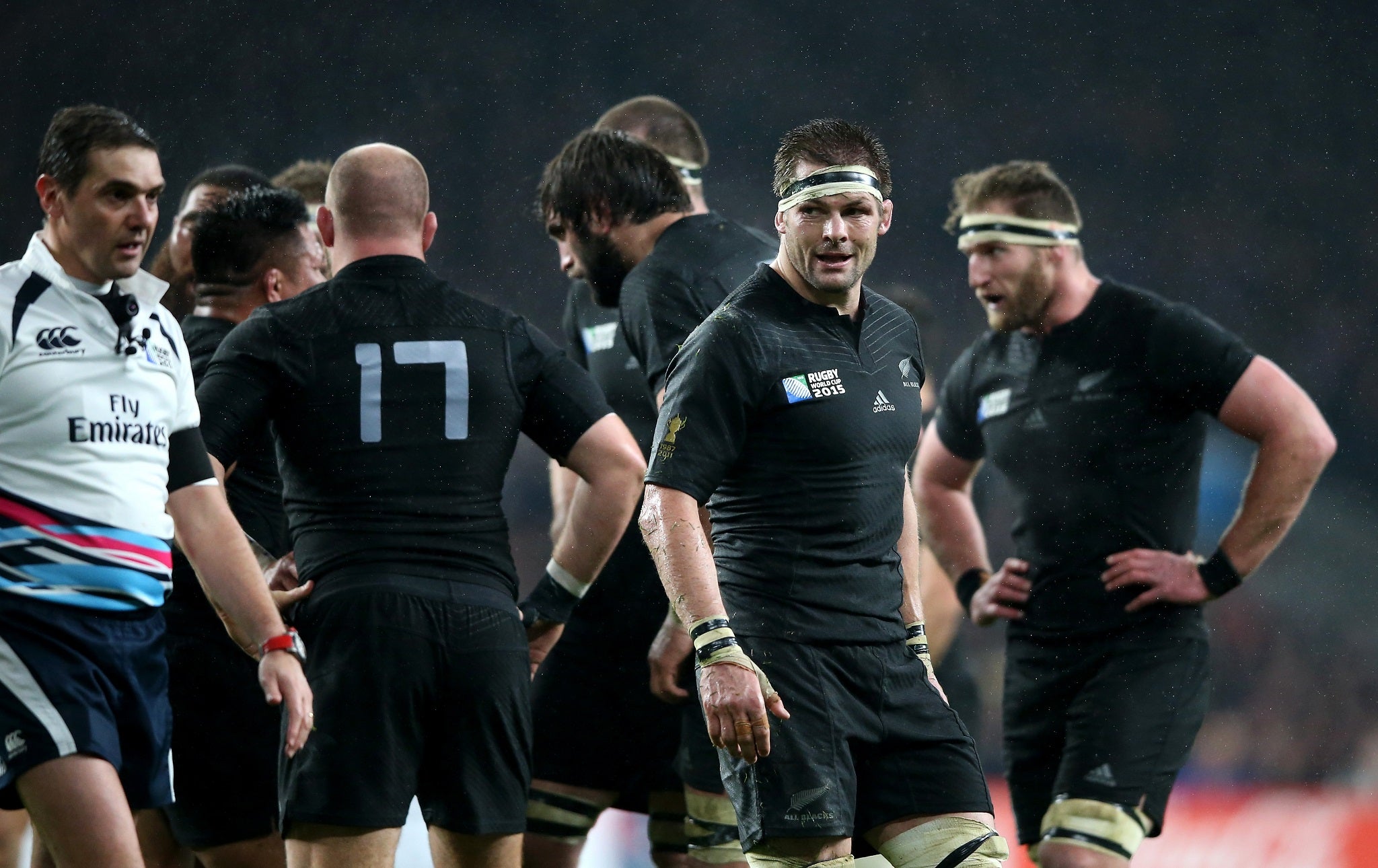South Africa vs New Zealand: All Blacks are beatable, but can Argentina or Australia prove they are capable?
The prospect of anyone beating the All Blacks at Twickenham next weekend is almost unfathomable

They’re beatable. God knows by whom – the 1974 Lions or the 1999 Wallabies might have a puncher’s chance, if someone could find a way of resurrecting them – but it does violence to logic to suggest that Richie McCaw and his All Blacks are above and beyond defeat. This much is certain, though: either Argentina or, perhaps more likely, Australia will need the performance from the ends of the earth to relieve the reigning champions of the Webb Ellis Trophy a week’ time.
There were moments yesterday at Twickenham, populated by so many New Zealanders that there must have been scores of ghost towns from Whangarei to Invercargill, when the holders were forced to give everything of themselves – to ransack whatever reserves of desire they carried with them into the business end of this oppressively claustrophobic semi-final against the most implacable of opponents. But by raiding the Springbok line-out, such a bankable green-shirted asset down the decades, and giving their outside-half Daniel Carter just enough of what he needed to shape the contest, they made it through.
In World Cup terms, Carter is the ultimate man on a mission. He already has a winner’s medal in his bottom drawer, but as injury denied him his moment in the sun on home soil in 2011, he has spent the last four years craving a gong that could legitimately be placed on the mantelpiece. He is within 80 minutes of it now and on this showing, he deserves to be.
Not even a team as familiar with trial by All Black as the Springboks could hope to avoid breaking out in sweats and tremors in the half dozen minutes or so before kick-off. There was the haka, for starters: nothing more than a rugby version of light comic opera until the great ogre Wayne Shelford transformed it into something far grander and immeasurably darker during the 1980s, it is now a public expression of supremacy before the fact.
On Saturday, the New Zealanders forsook the traditional “Ka Mate” version in favour of the “Kapa O Pango” routine – the one they rustled up themselves as a means of squaring up to opponents they regard as unusually threatening or particularly annoying. Apparently, it was a year in the making. Some of the South Africans looked as though they would take a whole lot longer to forget it.
But even before McCaw positioned himself at the sharp point of the arrowhead formation for this performance and treated the Boks to the most intense of lingering stares at its conclusion, there had been good reasons for the underdogs to wonder whether this might be a step too far. In the tunnel, the New Zealanders looked like the “unsmiling giants” of legend, unblinking in their focus. During the anthems, McCaw stood cheek by jowl with the other master strategists in his side: Carter, Kieran Read, Conrad Smith. If the devil could have cast his net, he’d have bagged four of the brightest union practitioners of this or any other generation – players so sensitive to the rhythms and dynamics of Test rugby, it is as if they can see the grass grow and hear it too.
There is no other way of explaining their brilliance at minimising their exposure to the scrum-based rugby they have come to despise – partly because they prefer to play the game in the open air rather than in the sulphurous depths of the set-piece and partly because they know they are underpowered in this department. Against France in the quarter-final at the Millennium Stadium, they avoided the darkened recesses for more than half an hour. Here, we waited fully 25 minutes for the first scrum. Some of the Kiwis' game management is too clever for words.
Yet there were also reasons to wonder whether their unrivalled rugby intelligence would be quite enough. The most critical of them was the wet weather, which swept in from the west and acted as a leveller – increasingly so as the contest wore on. It may not rain a fat lot in Johannesburg or Bloemfontein – a whole lot less than in Christchurch and Dunedin, that’s for sure – but the Boks, some of them looking like pairs of biceps with bodies attached as an afterthought, were better set up for a damp one.
This being the case, they were able to trade on, and live off, All Black errors at close quarters. And to be fair to the Boks, a high percentage of any good fortune they enjoyed was of their own creation. Fourie du Preez, a scrum-half so clever he might make Carter feel dumb, pulled every trick in the book to put the South African forwards in those areas of the field where the New Zealanders least wanted to see them, and if there have been better recent back-row performances against the holders than those delivered by Francois Louw and Duane Vermeulen, they took place behind closed doors.
It was not enough, though: if truth be told this was a seven-point New Zealand victory at the very least, dressed up as a two-point nerve-jangler. Even when the holders lost their eye-catching wing Nehe Milner-Skudder to some kind of orthopaedic trauma early in the second half, a player as good as Beauden Barrett was able to slot in without the back division missing a beat. With three minutes of taking the field, Barrett had almost concocted a try for Julian Savea and scored one himself. That’s what he does. It’s what the All Blacks do.
Join our commenting forum
Join thought-provoking conversations, follow other Independent readers and see their replies
Comments